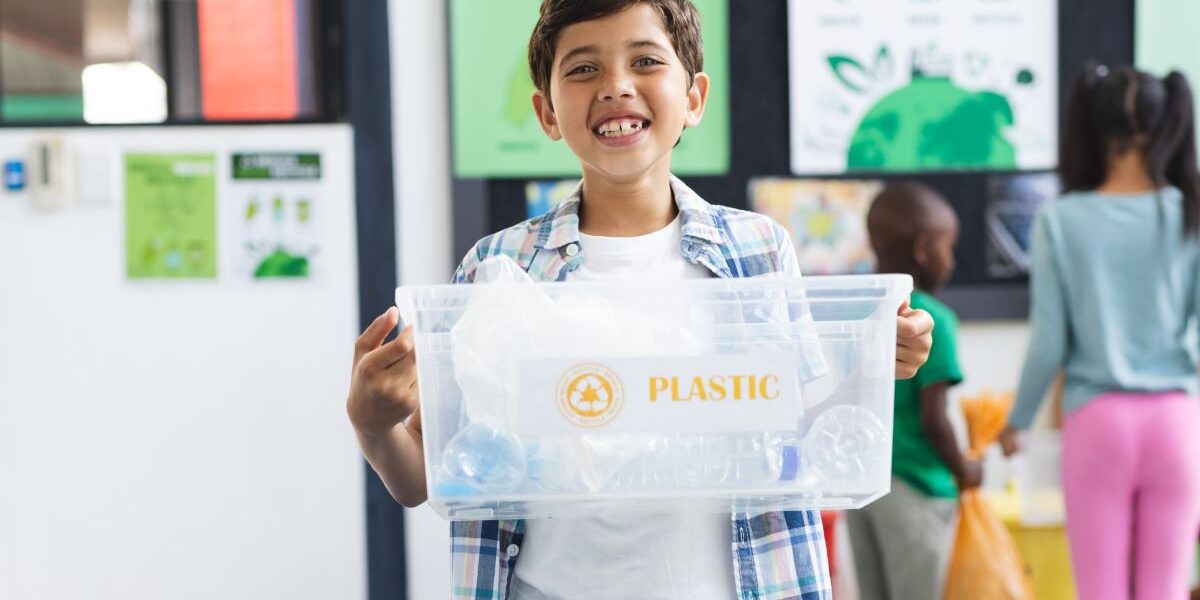April hosts Earth Day and Arbor Day, and June boasts World Oceans Day and World Environment Day. While these holidays lend themselves well to sunny springtime observations, the crucial lessons they inspire could get forgotten over summer break. Why not reinvigorate environmental awareness with a sustainability celebration in the fall to help care for our planet all year round?
Introducing Sustainability Day! Held on the last Wednesday of October, Sustainability Day presents an opportunity to add conservation habits into your daily classroom routines. It’s also a chance to broaden your students’ curiosity and appreciation for the world around them.
Before getting swept up in the winter holiday season, integrate Sustainability Day into your classroom. Develop a sustainability plan or sign a pledge with your students. There are plenty of fun, impactful ideas to set students up with healthy eco-habits.
Meet the Heroes of Sustainability
Ordinary people and small changes make a big difference. Introduce your class to the people behind the sustainability movement. Learn about the diverse individuals who enacted significant policy changes or inspired a generation to consider the environment around them.
Take Rachel Carson, an early 20th-century writer, and biologist who helped identify the inherent connection between humans and nature. Her work, Silent Spring, introduced people to the idea that humans have an ethical responsibility to care for the environment around them. Many credit her work as a spark for the modern-day environmental movement.
As another example, your students are undoubtedly familiar with Greta Thunberg, who, at just 16 years old, was nominated for the Nobel Peace Prize for her activism. Your students don’t have to write a book or sail across the Atlantic Ocean. Still, they’ll recognize their potential when they learn the stories of regular people who fought for climate justice and environmental protection.
Practice Meaningful Change
The concept of sustainability provides valuable content for high schoolers to learn but consider ways in which they could put that knowledge into action. We must establish a tangible baseline to create meaningful change. For example, identify your town’s closest waste management facility and discuss the many environmental hazards that landfills pose. As a class, weigh your daily trash output and track it for one month to ascertain the group’s waste footprint.
Once you’ve captured a baseline, celebrate Sustainability Day by developing real goals as a class. Discuss your average waste output and brainstorm strategies to minimize trash. How might your students reduce their impact on the local landfill? Showcase how small individual efforts can evolve into meaningful collective change.
Decode Greenwashing
Sustainability is a popular concept, and many businesses have implemented positive new practices to make themselves more marketable for eco-minded consumers. Sustainable fashion, organic foods, and upcycling are all popular steps that people take. However, some organizations leverage the sustainability trend without making actual efforts; they spin information to make their products seem sustainable. This misguided marketing ploy is called greenwashing; your high school students have undoubtedly experienced it.
Teachers can direct students to encyclopedia entries and related articles about greenwashing from trusted media sources. Your teenage learners can dive into more nuanced topics like marketing ethics and misinformation. Have them consider whether or not companies should be held financially liable for misleading consumers via greenwashing techniques. Young consumers are inundated daily by ad campaigns and marketing ploys; encourage your students to become savvy, environmentally conscious consumers.
There are many ways to approach sustainability. As a class, identify small but meaningful ways the school could become more sustainable. You could fundraise for recycling bins, research opportunities for a solar installation on the roof, or establish a community garden on campus.
Introduce positive sustainability habits early this school year. Your combined efforts make an even more significant impact.
This information is courtesy of Gale, which provides essential, curriculum-aligned digital content that empowers educators to solve curriculum challenges and meet students where they are, www.gale.com.









